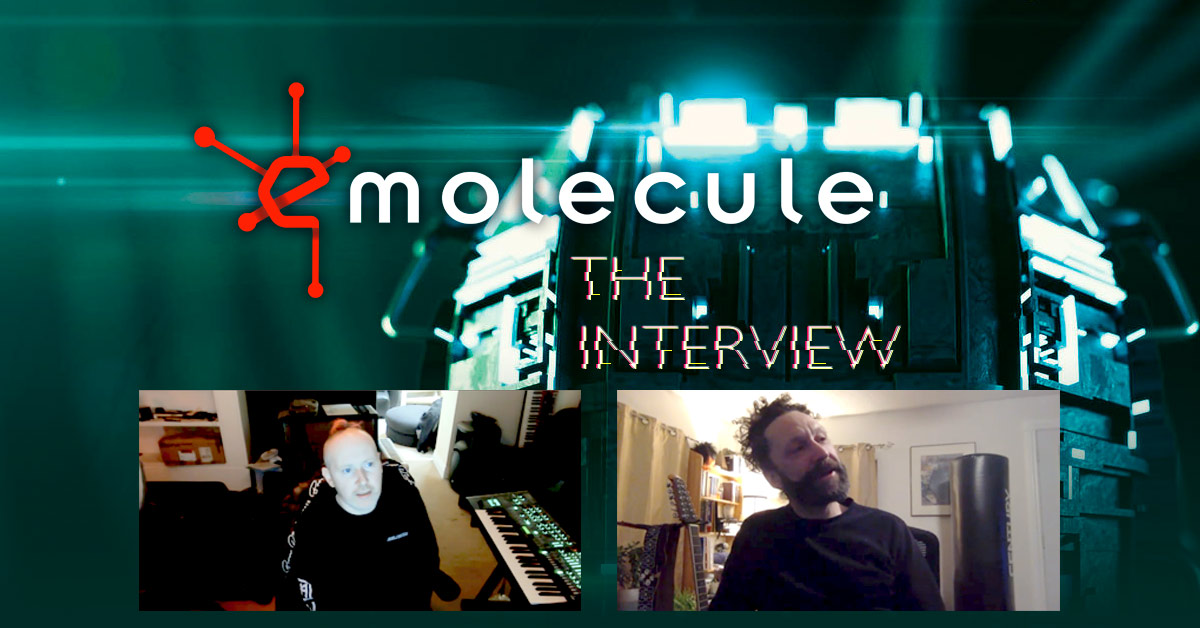- Article
- Read in 24 minutes
eMolecule – Interview with Simon Collins and Kelly Nordstrom (January 2023)
In the light of their debut album The Architect, we did an interview with Simon Collins and Kelly Nordstrom to talk about the eMolecule project and the first album.
Solo, Sound Of Contact, solo – Simon’s way with Kelly Nordstrom
It’s been a while since we last did an interview with Simon – back then his musical career was just starting and he didn’t know anything about Kelly Nordstrom yet. A lot has happened since then and Simon has gone through quite a few changes and evolved musically. He had probably made friends with Genesis fans the most with Sound Of Contact and the album Dimensionaut, but his last two solo albums U Catastrophe and Becoming Human also had many sympathizers among Genesis fans. Kelly Nordstrom was already involved in U Catastrophy, was also a part of Sound Of Contact and can also be heard on Simon’s latest solo album Becoming Human.
Their new project: eMolecule are a duo
Somewhat surprisingly, he then launched a new band project together with Kelly Nordstrom at the end of last year – eMolecule. The album The Architect will be released in February 2023 on InsideOut and this was reason enough for us to do an interview again – of course also with Kelly Nordstrom.
eMolecule: appreciation and pride regarding the connection with Genesis
We conducted a timely video with both of them via ZOOM. Kelly, by the way, also followed the work of Genesis with great interest, although he says that he is more interested in the later phase of the band than in the early prog phase. Simon, on the other hand, still looks back on his father’s work with pride and also told us that a song like Father To Son is no reason to be unpleasant in any forum even today – on the contrary – he says the song was great at the time and looks back on it with positive feelings even today.
This positive vibe was also evident in the interview. Both Simon and Kelly were in a great mood and showed a lot of enthusiasm regarding their new project.
The interview:
Genesis News Com: Kelly, let’s start with you, for Simon is the obvious connection to the Genesis fan club here. How did you meet Simon?
Kelly: I got a phone call out of the blue from a mutual connection that I didn’t really know particularly well. It was really a phone call out of the blue telling me about this gentleman Simon Collins who was auditioning musicians for his band at the time. This person asked me if I’d heard of him and I said “No, actually I hadn’t heard of Simon Collins.” – “Well, it’s the son of Phil Collins” I said “Oh, that’s very interesting.” So I listened to the music and was very intrigued right away by the music that I heard. I became interested in following through with the opportunity to audition for Simon’s band. This was back in about 2005.
GNC: And you were part of Sound Of Contact, obviously.
Kelly: Yeah. Originally I met Simon at an audition, from there I got the gig, first of all, I guess, to be the guitarist in his band. We became friends through that and did a lot of work together. First with me just as a hired gun, as a guitar player in his band, but we fast became friends. From there we developed a close relationship and started to work on original music together which eventually became the Sound Of Contact project. That was ten, twenty years ago easily now.
It was a very honest beginning in that we didn’t know of each other at first until I had an opportunity to do an audition with his band. He liked me enough on the spot.
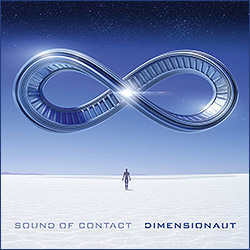
GNC: What have you been up to in the ten years since Sound Of Contact?
Kelly: Good question! I’ve been developing a relationship with a music school here in Victoria, Canada, called the Victoria Conservatory of Music, to become a music instructor here. I teach music, guitar, music in general and rock band as part of the school programme here. I do various music projects locally here as well.
GNC: So Simon, what have you been doing for the last ten years since Sound Of Contact before Becoming Human.
Simon: I did a bit of travelling, a bit of soul-searching. At one point I decided to take a longer break from music. I’d put everything I had into Sound Of Contact – even went bankrupt promoting it. It was really my dream band. I’d been working many years just to be able to put something together like that. But eventually we parted ways. It was very tumultuous, the whole process. We reformed in 2016 and have been trying to get things back on track, but it wasn’t to be. I spent some time on my own. I needed a break from music. I wasn’t inspired to do any more writing at the time. Of course, then Becoming Human came together, also with the support of Kelly. That was after a long struggle to get inspired to make music again. I really needed a long break.
GNC: And you moved to Ireland …
Simon: Yeah, I’m in Ireland. I’m west of Dublin, so I’m in rural Ireland. It’s great, it’s much more like I want it. It is my studio I’m talking to you from. I spend most of my time in the studio. And besides eMolecule I’ve got a couple more projects I am working on. For me it always wasn’t about being a successful solo artist so much as about being in a great band and with great people. And I really feel I’ve reached that. I think what Kelly and I have is very special, very great. It’s been brewing for many years. As you now, we’ve been working together for twenty years now. It’s great. I’m living out here and Kelly came over a few times to record here and we wrote some stuff in Ireland and recorded and produced it here as well. So having the studio here is great.
Kelly: It’s been my pleasure to travel to Ireland on a few occasions now to work with Simon person to person. We do as much as we can when we’re together and now we have a very good system for working remotely as well. We worked on the eMolecule album together in Ireland as much as we could. For the remainder we’ve worked remotely, me in Victoria sending tracks back and forth.
GNC: Simon, you mentioned your DJ-ing time in interviews but you never go into details. What genres did you feel drawn to?
Simon: It was in my twenties. I was mad about it, really into it. I started in my twenties under the name Space (something) and I DJ’ed specifically psychedelic trance and something goa trance – same thing really. I played all over the world. I did at a lot of raves in Germany, specifically. Germany’s always been a stopping point for me, as far as my music, my fan base. But I also play places like Burning Man in Nevada, a high festival. That had a very deep impact on how I produce music. I was very inspired by the production skillset of these electronic producers and the sound design and all that kind of stuff. That became a massive influence for me as far as making music. As you probably know, there’s a strong sense of electronic production in our work. It’s almost the backbone for most of what I do. It’s clearly evident in eMolecule – the ultra-modern production. So that’s the story of what I’ve done for ten years. And then I moved on to something else.
GNC: So you could say you, Kelly, are responsible for the traditional stuff and Simon does the modern stuff…
Kelly: That’s an interesting analysis. Of course, there is some truth to that, I think, in a way. When I strap on a guitar I just wanna play it hard. I might be making up for some of the ultra-modern production by playing strings to offset some of what happens in modern recordings these days, which is a lot of production. Which is good. But I think it’s also important to have the human element captured so I do that through the guitar and bass.
GNC: Let’s go briefly over the Sound Of Contact album. Dimensionautwas a very strong album, and people wondered why you didn’t continue with this band. It was amazing stuff you did together, after all. Can you shed some light on that?
Kelly: Yes… [hesitates] There was a lot of momentum at the time, but there were some personal things that I needed to take care of. So, unfortunately, it wasn’t in alignment with the way things were moving forward with Sound Of Contact. I needed to step down for personal reasons and allow the project to move forward.
GNC: Could you imagine that you’ll do something with Simon and the other guys from Sound Of Contact again, or is it a one-off project for you now?
Kelly: I suppose it’s possible, but, to be honest, I feel that as a duo with Simon this is the ultimate combination. I’m not getting any younger so I don’t need to mess around with anything else. This is the combination of personal and professional elements coming together in a perfect way for me. At this point I don’t really want to make any room for anything else because I have enough going on. For my whole life I have been working towards this point where I’d only have one thing to focus on. Right now, that’s eMolecule.
GNC: Simon did a solo album not too long ago. When did you get imvolved to work on the new album that would eventually become eMolecule then?
Kelly: As I said in the beginning, I met Simon originally as a hired gun to work on his solo materials. That has continued on through this entire time, continues on now, and if he has new original material to work on in the future I will certainly be available to contribute to that if he would like me on it. We will continue to work on that material as well.
GNC: How or when did you make the decision to do a joint project?
Kelly: That was … I guess, a couple of years ago now while I was in England at the time, to work on Simon’s album at the time which was Becoming Human. I had some extra time to myself between sessions and came up with this riff and all of a sudden all this music started flowing out. I recorded in the room where I was staying everything that became the demo for the song emolecule. That demo, which I played for Simon, was the catalyst to form a band.
GNC: How did you feel about this combination, Simon, and the idea to have a duo or a new band project together with Kelly.
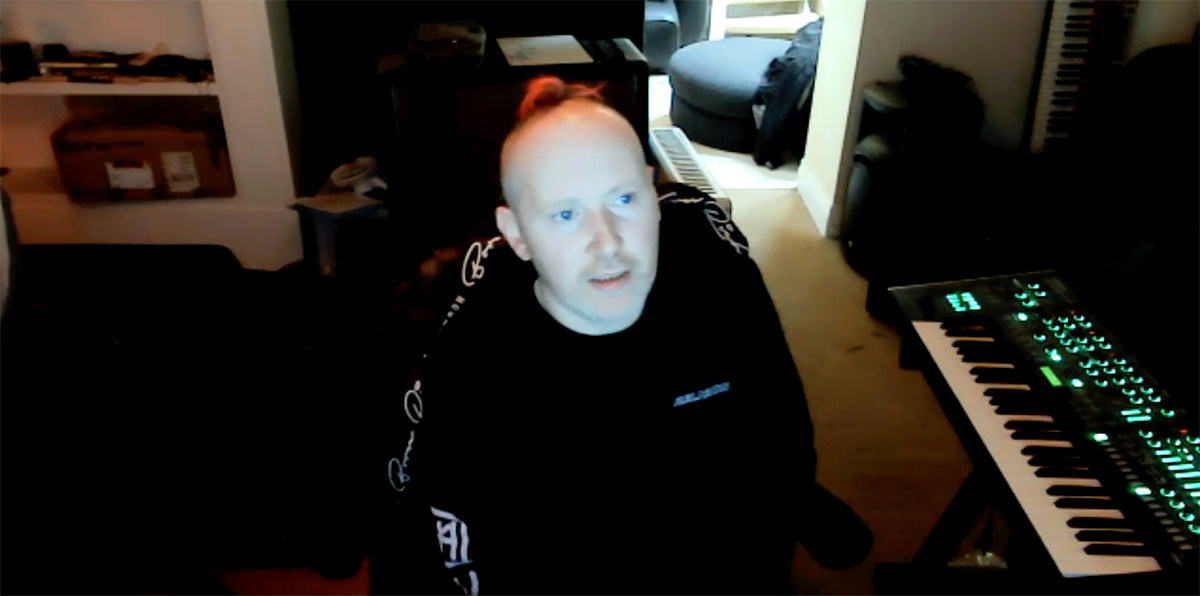
Simon: As Kelly just said, we made this album. But there was quite a bit of time elapsed between that moment and when we decided to form a band – I’d say a couple of years. Kelly came out to Ireland in September 2020. Originally the idea was to collaborate for my next solo album because I got this album deal with Frontiers Records so I owed them another solo album. I’d penned a lot of new material. Kelly’s got an amount of material, of songs that hadn’t been recorded. He started going through some of the material he’d written in the past. I was blown away, really excited about a lot of the material he had to offer. And I was very excited about what I had written. It didn’t take long, after a few days of working together I got the feeling I wasn’t ready to make another solo album. I wanted to live a little. It didn’t feel right. What felt right was our collaboration and our in-depth conversation and discussion. It was a great opportunity for us to explore the relationship we have through music. We decided it would be great to do a duo, to put a project together. We quickly turned from collaborating for my next solo album to writing a concept album. All in one month of being here. I first wrote the concept. I had three drafts of the concept, and then we started writing. We had about sixteen to eighteen tracks so we had a double album at time. We refined it down to 76 minutes which is still a big album. This is kind of how it came together. It wasn’t really much of a decision to make.
It just felt right. It was a very organic situation. It was obvious what I would be doing and what he would be doing. As I said, we share. I don’t play the guitar. Well, I play guitar a little. That is clearly Kelly’s role, also on bass. He does a lot of engineering and sound design as well on the album, and he also sings a song, The Moment Of Truth. I offered that role to him. I thought that’s be cool because he’s got a great voice as well. I thought it would be cool to have him sing one of the songs.
I do mainly all the vocals, a lot of sound design and production and , of course, the drums. These days, instead of playing on my original eleven piece kit I got an e-drum kit and a massive drum library, so I used that kit for the drum performances. I think it was really crucial because I was able to deliver whatever drum sound the song was calling for. It was great to have those options.
GNC: Did you use a drum machine as well?
Simon: I wouldn’t say drum machine, that’s old school. I programmed drums with the sound library.
Kelly: There’s a certain amount of hand-placing instruments – finger-drumming – it is a part of our music. You say drum machine, yeah, that is what it means.
GNC: So you each bring in fifty percent to each song then?
Simon: Ah, no. We help each other finish each other’s songs. Very few songs were finished pieces when we brought them to the table. Most of them were a tad incomplete. There were songs that were brought to the table from previous writing sessions, and we came up with some new material as well. It’s a combination. I’d say the album is a 50/50 balance of Kelly’s material and my material.
Kelly: I’d have to say the same thing. It’s quite remarkable, really. I don’t think we could’ve broken it down any other way. It wasn’t planned, but at the end of the day it also was true. It’s a very even split. Especially when we were writing the album Simon would come up with something, I would hear it and add something to it and vice versa. I’d be playing something on the keyboard and he came in and say “I like that” and we developed a song from that. The easiest thing to do was to go 50/50 at the end of the day.
GNC: You said you’re focusing on the emolecule project now, Kelly, and that you have more material written than is on the album. Does that mean you’re already looking into the future to do another one.
Kelly: Absolutely. There’s material that didn’t go on the first album ready to go already, not to mention new ideas. We’re on the precipice of making another album, for sure.
GNC: Will it be only you two, or will other musicians be involved?
Kelly: Just us. Through the process of making our debut album we realized that we would be best to be the producers of it as well.
GNC: How about going on the road with this, doing live gigs?
Kelly: I would love to. And yes, I believe that is the intention. That being said, the climate of the industry right now may dictate to some degree when we do that. There’s nothing I would like more than to perform this music live. We need to be smart in terms of how we approach it, it being a business and all.
GNC: Do you have an idea who could be in your live band. After all, it takes more than you two to perform that music on stage…
Kelly: I believe we’d need at least a four-piece band, a drummer and a multi-instrumentalist. We’re working on those aspects of the band right now.
GNC: Does that mean you’ll be doing the singing if there’s a live show, Simon?
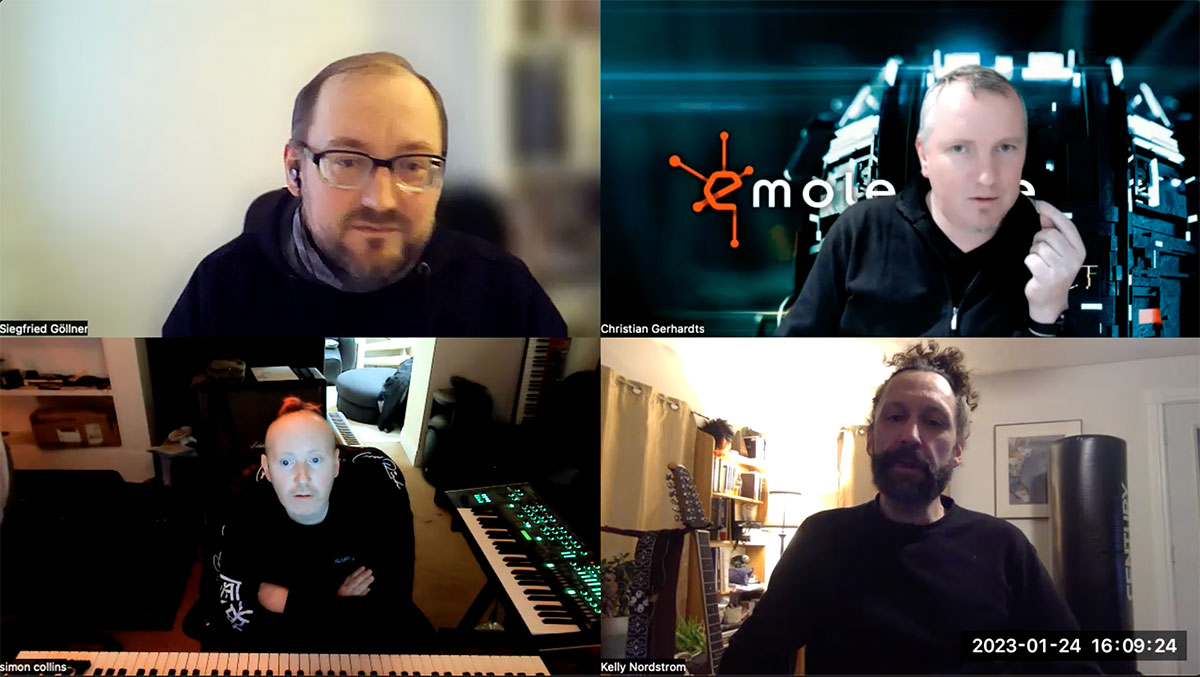
Simon: Absolutely. But Kelly would be involved in vocals as well. We’ll probably have two somethings drum kits on stage, I’ll probably have my e-drum kit so I’ll just walk over real quick and get on the kit. There are moments on the album where some double something drumming would sound really good. We’d probably have keyboard up there as well. There’d be another guy on stage for sure.
GNC: Let’s talk about something else for a while. You mentioned a lot of influences and things you were working on, Simon. Dimensionautwas truly a real prog album, and The Architect had moments where you could say “Yes, this comes from the people who did Dimensionaut”. Would you consider The Architect a prog album or something else?
Simon: Stylistically it’s all over the map. It’s progressive rock, bits of metal, it’s electronica, it’s industrial. It’s also fact they’ve got a lot of songs in popular-style song writing. Songs like Awaken– it’s your classic pop ballad. We really wanted to have diverse album. We threw the formula book out and made a dynamic album. It explores all of our influences and references. We were being true to ourselves. We have a saying: The song is king – what comes out of this songwriting process. We remain genuinely authentic throughout the process of writing.
GNC: How many recording sessions did you have when you met in person?
Kelly: Maybe two.
Simon: Three, I think. Kelly came over for about six weeks. We’d get a lot done. The last trip Kelly came out we shot four videos. Every few months, it seems, Kelly comes out and we get some work done. But it took us a year to do the album.
GNC: It is quite a move to have a track name that is also the name of the album and of the band. Why did you choose emolecule as the band’s name?
Simon: Kelly?
Kelly: [laughs] I think it’s a cool word. I came up with it. I like putting things together in a way that’s mathematical, like adding a letter to a formula. “Molecule” was important because it’s what makes us all. It’s what makes everything that we know. To put the “e” in front of it was to add a human element, emotion. From there it’s just a name to inspire us, really. Very much like the word “dimensionaut” which came before that album. It came from reading science fiction. I read a lot of science fiction, and often times I have a notebook beside me and I will write ideas that comes from the reading that I’m doing at the time. Emolecule is the same as dimensionaut in that way.
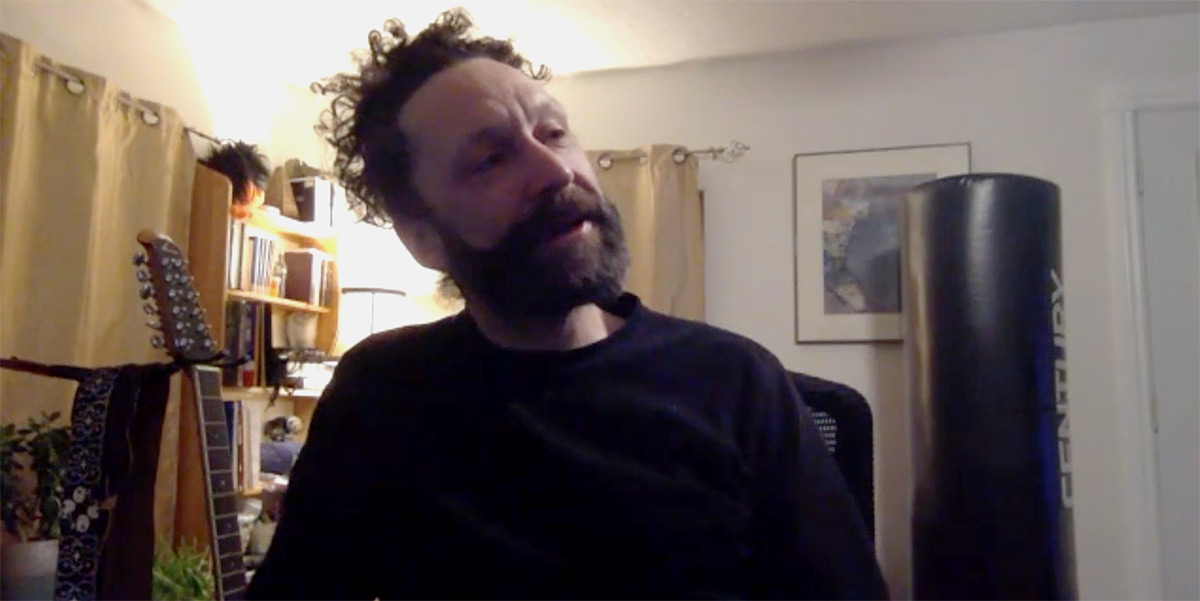
GNC: The track (eMolecule) is about ten minutes long, but you decided to put it out as the first single. Was it the record company’s decision, or why did you pick this particular song?
Kelly: We did have guidance on that. Thomas Weber from InsideOut suggested that the most commercial thing we could do was to do something uncommercial.
GNC: I think it was a good decision. It really was a surprise to hear something like this. There are tracks on the album, as Simon said – My You, for example – that would be a logical single. It’s got a melody, a hook, it’s a pop song. But this track is something else!
Kelly: It was a special track for me and for Simon as well. It inspired the union of us coming together this way. There is an energy about it which made it quite clearly a very good way to make our statement.
GNC: As we listened to the album we noticed that, with few exceptions like Awakenor My You, Simon’s voice is often very distorted. Why did you go that way? We felt that in some places maybe the plain voice instead of the distortion might have been preferable…
Simon: I feel it was about going for the grit. We always bow down to what the song needs. We’re a big fan of grunge and metal. If you think about it, the first half of the album is very dark. The second part of the album is lighter and more uplifting. That’s because of the story of the album. To get that effect, that brooding intensity, sometimes throwing distortion on the vocals helps. That’s pretty much all there is to it.
GNC: You mentioned that some of the material on the album dates back even further than Becoming Human. Were those completed songs or just ideas?
Simon: Some of them were completed songs, most of them were – I wouldn’t say: just ideas. That would not be right. I can’t speak for Kelly, but when I write I sit down and commit myself to at least getting a rough draft of the arrangement. I’ve got the verse nailed down, I got the chorus down, I got the middle nailed down. I don’t like just sitting down and tinkering about and walking away at this thing where I need to finish the idea before I finish the session.
But I would say most of my material for emolecule was written after Becoming Human. I was fresh. As far as Kelly goes, if you don’t mind me speaking, Kelly – there’s material, a song called The Architect which he wrote when he was eighteen. Which is great! Very strong songs. Most of them were pretty close to being finished. We worked around, we did some different arrangements. This is Kelly’s something album. He’s got a lot of material that hasn’t been recorded yet. So we found a treasure chest of material to work with.
Kelly: It’s true. There is a lot of fresh material on our album, but there’s also some stuff that, for me, had been kicking around since the ‘90s, that I’d never used before. I didn’t have any opportunity to have a vehicle. The ultimate opportunity came across to me in this duo with Simon Collins, and all of a sudden I was looking at my best material that I’d ever written. I was literally going back into the archives and thinking “oh yeah, this riff!” – turned out to be The Architect riff. I realized I had all these riffs that I hadn’t brought to the table yet and Simon was all over it. There’s a bit of the past on this album, but it’s very much in the moment as well because we were staying true to where we were at the time in writing new material as well.
GNC: Are there other songs beside The Architect that fall into this category?
Kelly:eMoleculeitself dates back to the Becoming Human stage. It was a new riff when I was in England working on Becoming Human, so that’s like time-stamped. Architectwas certainly one that had some old school riffs … and … that might actually be the end of it. Other than that it’s all new material.
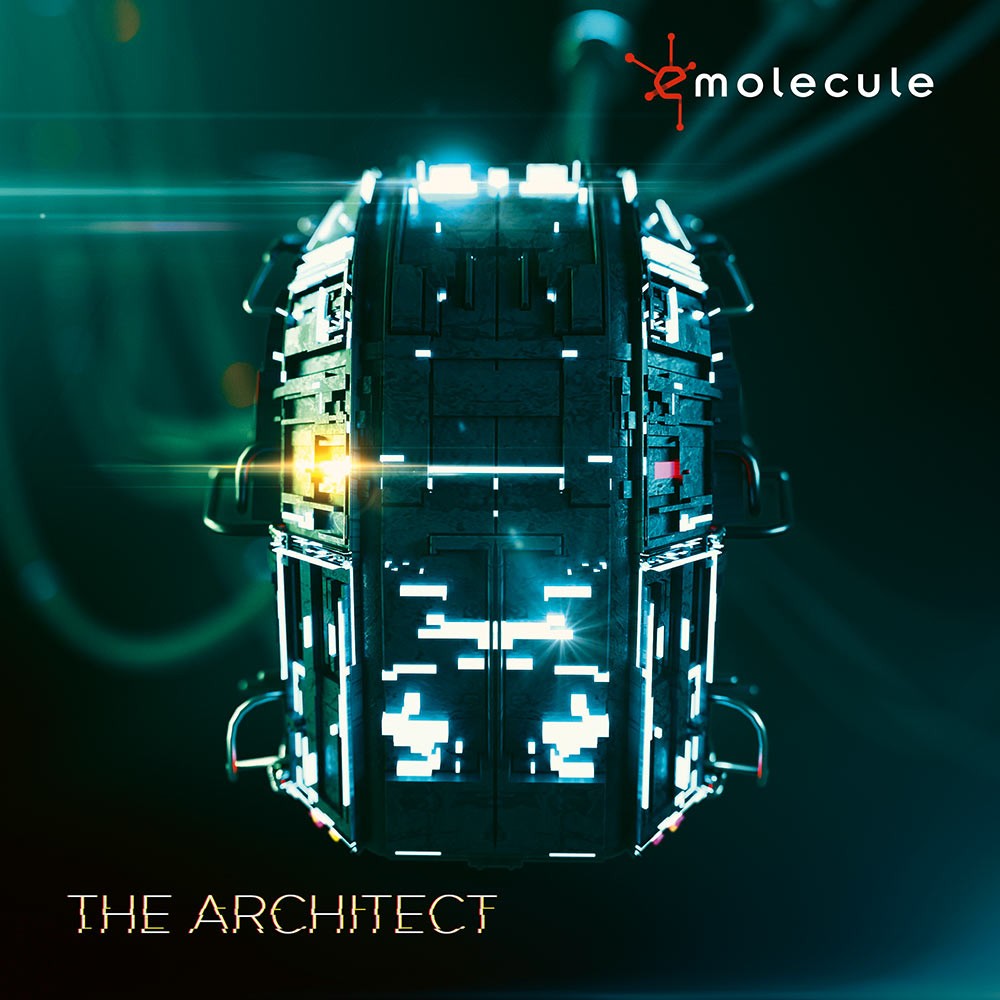
GNC: Do the lyrics also go back to earlier times?
Simon:They were mainly written after the songs were written. As I mentioned a few times, the concept dictated in most cases what the songs would be about. So we had a very specific job here. And we co-wrote all the lyrics together, some virtually, some here in the studio.
GNC: Can you guide is through the concept of the album?
Simon:Well, Kelly and I made the decision not to dig too deep into the concept. We really find it important for the audience to make their own intrepretation. But in essence, the character is the Architect and he is a globalist, a leader and he’s a bad guy in a science fiction setting. He’s out to crush the people. That’s why the first half of the album is quite dark and heavy, we are trying to convey the environment, the world he lives in. So there are tracks that explain his character, who he is etc. And what happens halfway through the album he discovers he got two weeks left to live. So his suffering, tries to commit suicide and has a near death experience and finds himself at gates of hell. And then he comes to life and realizes at that point that he will be going to hell. That is a turing point for him and inspires a spiritual journey to hand himself over to God. It’s about redemption. That’s why the second half is a little bit more uplifting. He’s starting to ask questions, why are we here? He’s discovering universe, and how that affects him, self reflection. That leads him to a final selfless act where he blows himself up and his entire regime. There’s a questions mark – where is he going after that? He’s done the work to get into heaven … but that’s for the listener to decide. That’ the general story.
GNC: So The Mastermind is the same person as The Architect?
Simon: The Mastermind is the same person, yes.
GNC: Do the lyrics in Prison Planet relate to the experiences during the pandemic?
Simon: Yes it does. There’s a lot of mirroring going on on this album. We wanted to find a way to express how we feel what has been happening to the planet recently – without being too literal. So we thought we could share those thoughts and feelings through this sci-fi setting. So how are we supposed to write those lyrics? Of course you write it from your own experiences and what you know. And specifically the spirutal transformation has a lot of our own experiences, from our own jorneys.
GNC: It also seems that – in parts – you play a bit with conspiracy theories …
Simon: Well say conspiracy, I don’t think there’s a theory. In my opinion. But yes you could say that. However you want it – it’s up to the listener. But certainly we’re playing a little bit with fire there.
Kelly: We wrote the lyrics in the moment, we didn’t set out to break something. Until the point we realized we were writing a story about darkness to light. Any connections to what wa sgoing on in the real world were random, like „oh, that may relate to that“. We were really compelled to write the story and then at the end of the day, that story can releate to anything in the world. Could relate to a current time frame, but also looking back.
GNC: Why did you write more lyrics for the track The Turn than are actually used on the track? So why lyrics for the instrumental part?
Simon:We also did that on Dimensionaut. There were two instrumentals and we decided to have lyrics nevertheless for those instrumentals printed in the booklet. Kelly wrote some really amazing poetry or we call them passages. I wrote a passage for In The Difference Engine and Kelly wrote one for Cosmic Distant Ladder. At that point I was thinking I would be singing on Cosmic Distant Ladder, so those were the lyrics intended for that. Then we decided to have an instrumental but wanted the lyrics to be there. We did the same with The Turn. It’s a poem that I wrote. It describes our character in the situation trying to find himself, with his near death experience and them coming back with a whole new mindset. That’s where that comes from.
GNC: Will the next album continue that story or will it be something different?
Simon: I’m not sure at the moment. All we know is that we got quite a bit material for it already. Will it be a similar concept? Well, we’re not sure. We now totally enjoy that album the music, having a storyline. So I can’t tell at the moment.
Kelly: I think it’s safe to say that those things present themself at the time. One of the things I appreciate about wirting with Simon is that we will always make decisions based on the moment. We not necessarily preconceive ideas and say „oh let’s do a pop album next“. We will write what’s true to us in that moment and if it turns out to be a concelt album so be it.
GNC: I heard in another interview that you did a four track demo for InsideOut, can you reveal what songs that were?
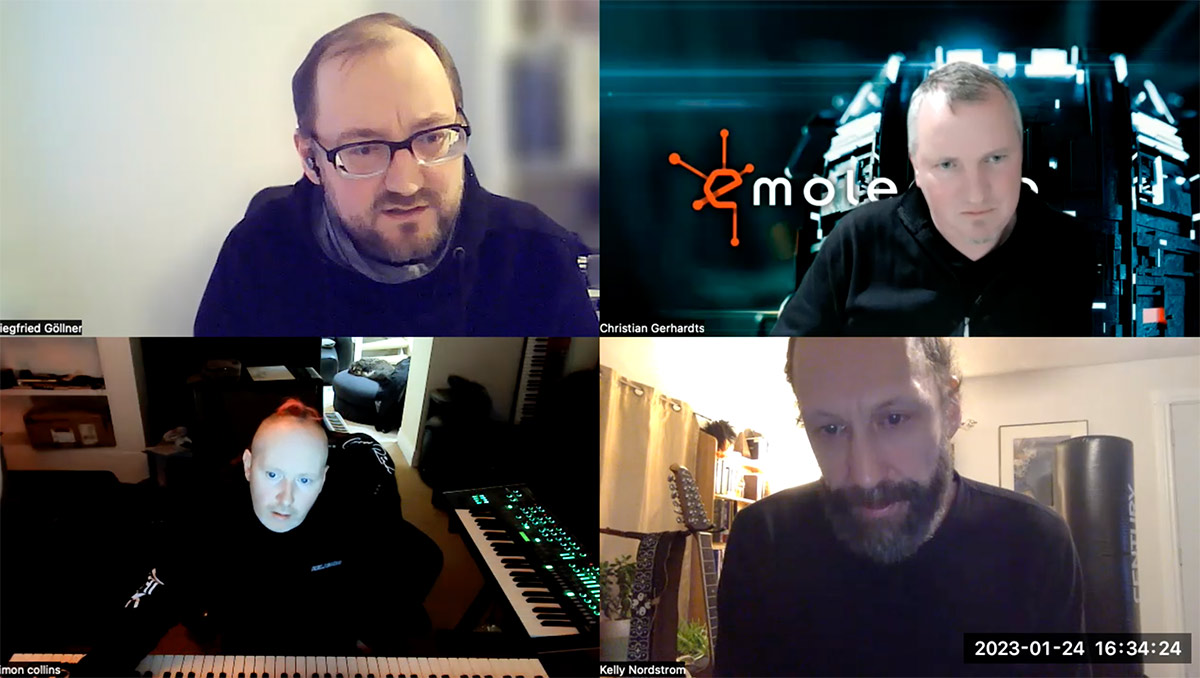
Simon: Yes, it was eMolecule, The Turn, Awaken and Prison Planet. We recorded that with Robbie Bronniman, who also coproduced my album Becoming Human. So they were demos, although that’s also an old school term, but nonetheless it’s a demo. We made it exclusively for InsideOut. They do things properly, they do things right, they are a great label. I know that from working with them with Sound Of Contact. Thomas Waber there is such a nice guy and great to work with. So we wanted a deal, hopefully an extensive deal, to develop the band with them at our side. And that was what we achieved. We ended up getting a three-album-deal, which is a great start to rebuild a relationship with them. Of course Sound Of Contact was fortunate for us, Thomas knew what to expect and that helped.
GNC: Simon, You brother Nic played Drums during the last Genesis tour. Have you seen him play and what are your thoughts?
Simon: Nic is a really talented drummer. We are in touch and talk, I see him often and I couldn’t be more supportive, what he’s been doing. When I was his age I also got the opportunity to play drums on stage with my dad on several occasions during his solo tours. I did a drum battle with Luis Conte, Ricky Lawson and my dad. That was crazy, so much fun. I’m really happy for my dad and Nic they could share that.
GNC: So maybe you have a live drummer for the emolecule gigs in your own family then.
Simon: Well you know I offered him to drum for eMolecule – but we don’t know if that’s gonna happen or not. We also have some other options and of course it’s about logistics and he’s also busy, so … would be fun of course.
GNC: We’ve come to the end now – thanks for taking time, actually a full hour, for this interview
Simon: Much appreciated, was a great pleasure!
Kelly: Thanks for this intersting conversation. Take care!
An extensive review about the album is available at this link.
Interview: Christian Gerhardts & Siegfried Göllner
Trabscript: Martin Klinkhardt & Christian Gerhardts

